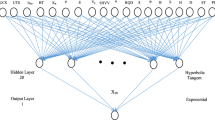Abstract
Over the last few years, use of artificial intelligence (AI) has increased in many areas of mining and allied branches of engineering. The technique has been successfully applied to solve many engineering problems and has demonstrated reasonable feasibility therein. A review of the literature reveals that geotechnical studies, mineral processing, reserve estimation, rock fragmentation etc. are some of the areas of mining engineering where AI based approach has been successfully implemented.
This paper aims to briefly provide a general view of some of the existing AI based models for prediction of rock fragmentation. Empirical studies for estimation and assessment of fragmentation are also reviewed. The reach and flexibility of basic AI techniques have been elucidated.
Access this chapter
Tax calculation will be finalised at checkout
Purchases are for personal use only
Preview
Unable to display preview. Download preview PDF.
Similar content being viewed by others
References
Bahrami, A., Monjezi, M., Goshtasbi, K., Ghazvinian, A.: Prediction of rock fragmentation due to blasting using artificial neural network. Engineering with Computers. Springer-Verlag, London Limited (2010)
Cunningham, C.V.B.: The KuzRam Model for Prediction of Fragmentation from Blasting. In: Holmberg, R., Rustan, A. (eds.) Proceedings of 1st International Symposium on Rock Fragmentation by Blasting, Lulea, Sweden, pp. 439–453 (1983)
Cunningham, C.V.B.: Fragmentation Estimations and KuzRam Model—Four Years On. In: Proceedings of 2nd Int. Symposium on Rock Fragmentation by Blasting, Keystone, Colorado, pp. 475–487 (1987)
Kapageridis, I.K.: Artificial Neural Network Technolog. In: Mining and Environmental Applications, Mine Planning and Equipment Selection 2002, VŠB - Technical University of Ostrava, Prague (2002)
Yilmaz, I., Erik, N.Y., Kaynar, O.: Different types of learning algorithms of artificial neural network (ANN) models for prediction of gross calorific value (GCV) of coals. Scientific Research and Essays 5(16), 2242–2249 (2010)
Jade, R.K., Sen, P., Pathak, K.: Optimal Blast Design - A New Approach. Minetech 20(4&5), 54–60 (2010)
Kulatilake, P.H.S.W., Qiong, W., Hudaverdi, T., Kuzu, C.: Mean particle size prediction in rock blast fragmentation using neural networks. Engineering Geology 114, 298–311 (2010)
Kuznetsov, V.M.: Mean diameter of fragments formed by blasting rock. Soviet Mining Science 9(2), 144–148 (1973)
Arbib, M.A.: The Handbook of Brain Theory and Neural Networks, 2nd edn., pp. 22–23. The MIT Press, Cambridge (2003)
Mishnaevsky Jr., L.L., Schmauder, S.: Analysis of rock fragmentation with the use of the theory of fuzzy sets. In: Barla (ed.) Proc. Eurock 1996. Balkema, Rotterdam (1996)
Kazem, O., Bahareh, A.: https://dspace.stir.ac.uk/bitstream/1893/2297/1/Fragmentation.pdf (downloaded on February 19, 2011)
Ouchterlony, F., Niklasson, B., Abrahamsson, S.: Fragmentation monitoring of production blasts at Mrica. In: McKenzie, C. (ed.) International Symposium on Rock Fragmentation by Blasting, FragBlast 3, Brisbane, Australia, pp. 283–289 (1990)
Estrada-Ruiz, R.H., Pérez-Garibay, R.: Neural networks to estimate bubble diameter and bubble size distribution of flotation froth surfaces. The Journal of the Southern African Institute of Mining and Metallurgy 109, 441–446 (2009)
Dunne, R.A.: A Statistical Approach to Neural Networks for Pattern Recognition. John Wiley & Sons, Inc., Hoboken (2007)
Das, S.K., Kumari, P., Bhattacharyya, K.K., Singh, R.: Multi-Input Multi-Output Artificial Neural Network Model to Predict the Separation Characteristics of Iron Ore by a Magnetic Separator. In: Proceedings of the XI International Seminar on Mineral Processing Technology (MPT 2010), pp. 327–335 (2010)
Lee, S., Oh, H.-J.: Application of Artificial Neural Network for Mineral Potential Mapping. In: Hui, C.L.P. (ed.) Artificial Neural Networks – Application, pp. 67–104. InTech Publishers (April 2011)
Rao, V.B.: C++ Neural Networks and Fuzzy Logic. M&T Books, IDG Books Worldwide, Inc. (January 1995) ISBN: 1558515526
Author information
Authors and Affiliations
Editor information
Editors and Affiliations
Rights and permissions
Copyright information
© 2014 Springer International Publishing Switzerland
About this paper
Cite this paper
Dhekne, P.Y., Pradhan, M., Jade, R.K. (2014). Artificial Intelligence and Prediction of Rock Fragmentation. In: Drebenstedt, C., Singhal, R. (eds) Mine Planning and Equipment Selection. Springer, Cham. https://doi.org/10.1007/978-3-319-02678-7_86
Download citation
DOI: https://doi.org/10.1007/978-3-319-02678-7_86
Publisher Name: Springer, Cham
Print ISBN: 978-3-319-02677-0
Online ISBN: 978-3-319-02678-7
eBook Packages: EngineeringEngineering (R0)




